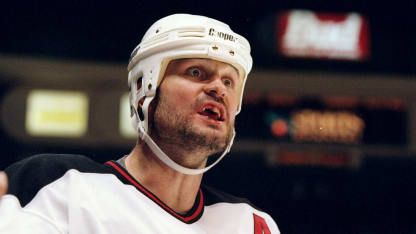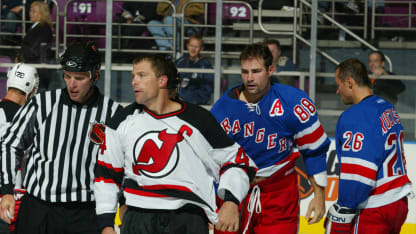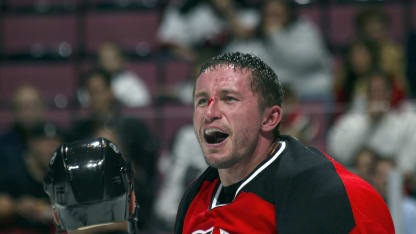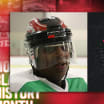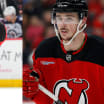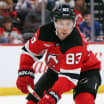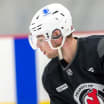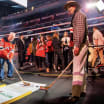And I present to you the remaining top 20 in alphabetical order...
David Clarkson
For a short - yet illustrious - period (2006-07 to 2012-13) the Toronto-born right wing combined fistic enthusiasm with significant offense. He titillated Devils fans in bouts with the hated Ranger Sean Avery. In one such clash at The Rock, Clarkson grabbed the helpless Blueshirt and literally tossed him around like a rag doll.
Artistically, David is best remembered as a 2012 playoff hero. He scored three goals and nine assists in 24 games but all three of his goals were game-winners including a classic against the Philadelphia Flyers.
Troy Crowder
Unlike Clarkson, this monster of a man had absolutely no artistic value but he did have big fists and he used them well. The Sudbury, Ontario native did something rare in National Hockey League fistic annals. In a game against the Detroit Red Wings in East Rutherford, Crowder went head to head with Bob Probert, then considered the unofficial Heavyweight Champion of the NHL. To the amazement of the home crowd, Crowder belabored his notorious foe and was acclaimed as the victor. Not surprisingly, they fought again only this time Probert slugged to his ability and compensated for what had been an ugly defeat. Then, GM Lou Lamoriello got even more value out of Crowder when Detroit, ironically picked up Troy in 1991. In return New Jersey gained Randy McKay and Dave Barr who would prove to be huge assets. Crowder never amounted to much after leaving the Devils.
Bobby Holik
By far, one of the most successful "Fourth Lines" in league annals was centered by the Czech-born bruiser. In another trade gem, Lamoriello obtained Holik from Hartford in 1992 and Bobby thrived in New Jersey. With his wingmen, Randy McKay and Mike Peluso, the trio often backed the opposition into the enemy end and then bulldozed their way to a goal. Both Holik and McKay were more the artistic ones while Bobby had a take-no-prisoners frame of mind which was abetted by his big body and sometimes unorthodox maneuvers. One of them - according to foes - was Holik's propensity to "kick skates," otherwise known as "slew footing." It simply was another part of Bobby's arsenal the theme of which was, "I'll do anything to win." Extremely confident and scholarly, he brought a rock 'em, sock 'em style that perfectly meshed with his Crash Line partners.
Garry Howatt
"The Toy Bulldog" earned his reputation as a dynamo on Long Island after he helped the Nassaumen win Stanley Cups in 1980 and 1981. Although miniscule compared with the behemoths of his day, Howatt never turned away from a fight. "What made him such a battler," said Islanders Hall of Fame coach Al Arbour, "was Howie's love of battle, together with his intensity and absolute fearlessness. I don't care how big the opponent may have been, anyone who went with Howatt knew he was in for a licking." Unfortunately, Devils fans never got to see Howatt in his prime since he was at his best in the late 1970's and into the two Cup seasons."
Cam Janssen
A very rare St.Louis, Missouri product to reach the NHL, Janssen made his debut against the Rangers in the 2005-06 season. It took absolutely no time at all for Cam's explosive nature to win the hearts of the New Jersey Faithful. "What made Cam so scary," said David Clarkson, "is that he was like a latter-day Tie Domi; a little guy who hit like a wild windmill."
Jim Korn
When Lou Lamoriello took over Devils management in the summer of 1987, he had a very definite vision in terms of new personnel. "I wanted players who could fit into the lineup and those who would not be pushed around," Lou explained.
A native of Hopkins, Minnesota, Korn was a natural for Lou. Jim had played four years of collegiate hockey for Lamoriello at Providence College where he was an award-winner. At 6-foot-4, 240 pounds, Korn was at home playing forward or defense. When he arrived in East Rutherford for the 1987-88 season, Jim already had plenty of NHL experience in Detroit, Toronto and Buffalo. "Having a big, tough hombre on our team like Jim gave us plenty of confidence in the physical department," said scrappy forward Claude Loiselle.
David Maley
"I liked fellows who played for the Canadiens because they had a winning tradition," Lamoriello explained. "That's why I went after Maley." Sure enough, the Wisconsin native skated for the 1986 Stanley Cup champion Habs before his five-year stint in New Jersey. Hollywood handsome and one of the most genial Devils, David was not convivial on the ice. During the 1988-89 season his penalty minute total was an astronomical 249 minutes including a few winning bouts here and there. David was a potent part of the 1987-88 squad that captured the franchise's first playoff berth on the final night of the season. He proceeded to help the club stun the hockey world by reaching the third round of the playoffs.
Hector Marini
After winning a Stanley Cup with the New York Islanders in 1981, this Northern Ontario stickhandler learned how the "other" half lived when he arrived in East Rutherford. The 1982 Original Devils had a roster pockmarked with fringe big leaguers who needed leadership. For two seasons Marini did his best to bring leadership to a ragtag squad. He never earned any medals for this but was appreciated by the general staff. "Hector was the kind of player we could toss out there any time to rough up the opposition," said the Devils general manager Max McNab. "He was a grit guy who'd take on anyone."
Jim McKenzie
There was nothing fancy about this product of Gull Lake, Saskatchewan. From his earliest days of Junior hockey, and moving forward, his fame was directly linked to his overall toughness and fighting ability. "He was the kind of player that every team needed to keep the opposition honest," said Lamoriello, who acquired the husky hustler in 2001. Although scoring was not his forte, Jim compensated by being one of the 2002-03 Devils ice cops. "McKenzie was one of our lesser lights but effective," said Cup-winning coach Pat Burns. As for the numbers, McKenzie totalled 1,739 penalty minutes over his turbulent career.
Lyle Odelein
Another of Lou's Montreal acquisitions, Odelein arrived in New Jersey in time for the 1996-97 season. An integral part of the Canadiens' 1993 Cup-winners, this native of Quill Lake, Saskatchewan, could have been a Ken Daneyko double. Raw, husky, a low (141st) Draft pick, Lyle established himself as solid a backliner as there was without being an All-Star. "If ever there was a player who epitomized true grit, Odelein was that one," said a Devils beat writer. "And, off the ice, you had to love a guy who always seemed to have a smile on his face." On the pond, he had a career total of 184 fights - part of a penalty minute total of 2,316.

